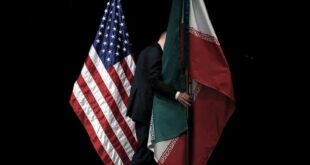 TEHRAN (Fars News Agency)- Foreign Ministry Spokesman Seyed Mohammad Ali Hosseini stressed that Iran would continue its nuclear activities within the international and Non-Proliferation Treaty (NPT) rules and regulations.
TEHRAN (Fars News Agency)- Foreign Ministry Spokesman Seyed Mohammad Ali Hosseini stressed that Iran would continue its nuclear activities within the international and Non-Proliferation Treaty (NPT) rules and regulations.
Addressing a weekly press briefing here in Tehran on Sunday, Hosseini noted the Tuesday meeting of the 5+1 group -i.e. the five permanent UN Security Council members (France, Britain, China, Russia and the United States) plus Germany- and said, “They are keeping up with the previous trend in a bid to reach a broad consensus in favor of UN sanctions against Iran. Unfortunately, some UNSC member states are insisting that the same trend should be continued but we, irrespective of their actions, continue with our nuclear activities within the international criteria and NPT rules and regulations.”
Elsewhere, he pointed to the recent visit to Tehran by the Zimbabwean president, and said that the two sides signed 6 agreements and Memoranda of Understanding (MoU) on cooperation in agricultural, economic, technical and educational fields as well as Iran’s oil and developmental assistance to that country.
Hosseini said that President Ahmadinejad insists on the expansion of ties with the African states, reminding that such visits indicate Iran’s firm determination to promote its level of ties with African countries.
He also referred to the visit to Iran by Iraqi President Jalal Talabani, and pointing to growing Iran-Iraq relations ever since the fall of Saddam’s regime, he said that the two sides’ cooperation has been experiencing the same developing trend under Nuri al-Maliki’s administration.
The diplomat said that Iran’s active participation in the various economic and industrial projects in Iraq coupled with continued exchange of visits by the two countries’ officials have paved a proper ground for the promotion of Iran-Iraq ties to a large extent.
He denied reports about submission of a message from the US to Iranian officials during Talabani’s recent visit to Tehran.
He also noted the Gambian President’s trip to Iran, and expressed the hope that the two countries’ current talks about economic, power and agricultural cooperation would yield positive results.
Elsewhere, the Foreign Ministry spokesman expressed his sympathy with the Filipino government and nation on the recent landslides and floods in that country.
Asked about the remarks by Iranian Foreign Minister Manouchehr Mottaki about espionage activities by the Canadian embassy in Tehran, he stated, “What Mr. Mottaki mentioned in his joint press conference with the Malaysian Foreign Minister pertained to the past activities of the Canadian embassy.”
Asked about the goals pursued by President Ahmadinejad in writing recent letters to the US nation and George W Bush, the spokesman said, “These letters can enlighten the world and the US public opinion about the current trend of affairs and the present situation in the United States and the negative consequences and aftermaths of the US’s wrong policies in different world regions.”
Expression of realities, emphasizing the need for revising incorrect methods and approaches and portraying an outlook which shows the very desirable relations that the world nations can and deserve to enjoy in future could all be stated as among the other goals pursued by these letters, he added.
The Foreign Ministry spokesman also pointed out that such letters and messages can, to a large extent, serve to neutralize the impacts of the negative propaganda by the US-affiliated media against Iran.
As regards the meeting between Turkish Prime Minister Recep Tayyip Erdogan and Iranian President Mahmoud Ahmadinejad, he said Tehran and Ankara share abundant grounds and potentials for cooperation, adding that both countries are endeavoring to make an optimum use of the existing economic and industrial potentials and exchange technical and engineering services in a bid to boost their ties.
He also stated that the two sides have discussed common concerns about the present conditions in Iraq and the foreign troops deployed in that country.
Noting the planned meeting between the Turkish Premier and the Supreme Leader of the Islamic Revolution Ayatollah Seyed Ali Khamenei, Hosseini expressed hope that Erdogan’s visit to Tehran would incite the two countries’ in depth cooperation.
Pointing to the United States’ new approach in the region and Washington’s efforts to create a Sunnite crescent vis-Ã -vis the Shiite populations, he viewed the US interference in the region as an effort to foment domestic, ethnic and religious conflicts in Iraq.
The official accused the United States of industriously attempting to trigger religious violence, specially between the Shiite and Sunnite Muslims, in Iraq.
“Iran has always underscored the necessity for all the Iraqi peoples and religious and ethnic groups to lead a peaceful life alongside one another and work for the progress and development of their country,” he stated.
Asked to comment on the recent remarks by a Saudi official, Hosseini reminded that Saudi officials have always stressed the need for safeguarding Iraq’s national unity, saying that Tehran and Riyadh share common concerns about Iraq.
He reiterated that Iraq’s neighboring states can contribute to the security, development and prosperity of the country through cooperation, and said that Iran’s proposal for the arrangement of a ministerial summit of Iraq’s neighbors has served the same goal.
Asked about the recent remarks by Valid Jonbalat about Iran, he noted Jonbalat’s previous statements about Iran, and stressed, “As frequently stated, we have never intervened in the domestic affairs of any country, including Lebanon.”
The Foreign Ministry spokesman underlined that the Lebanese political leaders, subject to a national resolve can find desirable solutions to that country’s domestic problems.
Emphasizing the importance of national unity and talks among the Lebanese groups and people, he expressed the hope that Lebanese could remove their problems away from foreign intervention.
He also pointed to some reports quoting Egyptian President alleging that Iran has been involved in the recent unrests in Lebanon, and mentioned that the said reports have misquoted Hosni Mubarak.
“Mr. Mubarak has just expressed his concern about the current issues of Lebanon,” Hosseini pointed out.
He assessed the previous statements of Mubarak and other Egyptian officials about regional issues as positive, and assured that Egypt will remain with the Lebanese nation.
Asked about the follow-ups on the case of the four Iranian diplomats kidnapped in Lebanon in 1982, Hosseini said that the issue is still being pursued, and added, “All the four are alive. They have been kidnapped by supporters of the Zionist regime in Lebanon and we have corroborative evidence that they have been handed over to the Israeli regime. Therefore, the question can be unwrapped by the Israelis.”
Elsewhere he said that the Head of Russia’s Federal Atomic Energy Agency, Sergei Kiriyenko, is scheduled to pay a visit to Tehran on 11 December to attend the 6th meeting of Iran-Russia joint economic commission.
The Foreign Ministry spokesman denied the point that Moscow has changed its stances on Iran’s nuclear issue, and continued, “Russia is striving to restrict and reduce the number of the possible sanctions the US and EU3 (Britain, Germany and France) are endeavoring to impose on Iran, and we are satisfied with Moscow’s efforts in this ground.”
Asked to assess the remarks of the Russian officials about sanctions, the spokesman stated, “It has been proposed to impose sanctions on the import of nuclear weapons and their related parts, which is not at all related to us, because we do not have any nuclear weapons or nuclear weapon program.”
Referring to the recent remarks by the US Secretary of State Condoleezza Rice about Iran sanctions measure, the foreign ministry spokesman reminded that the United States has and will never spare any efforts to damage the interests of the Iranian nation, and said that such moves are typical of Washington.
 Eurasia Press & News
Eurasia Press & News


